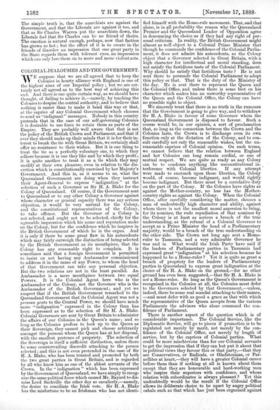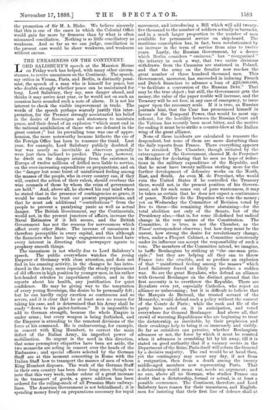COLONIAL JEALOUSIES AND THE GOVERNMENT.
WE suppose that we are all agreed that to keep the Colonies in hearty alliance with England is one of the highest aims of our Imperial policy ; but we are cer- tainly not all agreed as to the best way of achieving this end. And there is one quite certain way, as we should have thought, of failing to achieve it,—namely, by teaching the Colonies to despise the central authority, and to believe that nothing is easier than to make it bend this way or that, at the caprice of any Colonial Government which chooses to send us "indignant" messages. Nobody in this country pretends that in the case of our self-governing Colonies it is desirable to use force to retain them as parts of the Empire. They are probably well aware that that is not the policy of the British Crown and Parliament, and that if ever they should make up their minds that it is for their in- terest to break the tie with Great Britain, we certainly shall offer no resistance to their wishes. But it is one thing to treat the tie as a perfectly voluntary one, to which they adhere because it is one they like and by which they profit; it is quite another to treat it as a tie which they may modify at their own pleasure, even in relation to the dis- cretion which is constitutionally exercised by her Majesty's Government. And this is, as it seems to us, what the Queensland Government are doing when they instruct their Agent-General to express " indignation ' at the selection of such a Governor as Sir H. A. Blake for the Colony of Queensland. Of course, if the Government sent to Queensland or to any other Colony a Governor against whose character or general capacity there was any serious objection, it would be very natural for the Colony, and the constitutional representatives of the Colony, to take offence. But the Governor of a Colony is not selected, and ought not to be selected, chiefly for the agreeable impression which his name and reputation make on the Colony, but for the confidence which he inspires in the British Government of which he is the organ. And it is only if there be some great flaw in his antecedents which may fairly outweigh the distinction of being selected by the British Government as its mouthpiece, that the Colony has any reasonable right to complain. It is sometimes said that a foreign Government is permitted to insist on not having any Ambassador commissioned to address it in the name of any Power, to whom the head of that Government can take any personal objection. But the two relations are not in the least parallel. An Ambassador is a mere mouthpiece between two equal Powers. It is the Colonial Agent here who is the Ambassador of the Colony, not the Governor who is the Ambassador of the British Government ; and yet we suspect that if the British Government remarked to the Queensland Government that its Colonial Agent was not a persona grata to the Central Power, we should have much more " indignation " expressed in the Colony than has been expressed as to the selection of Sir H. A. Blake. Colonial Governors are sent by Great Britain to administer the affairs of our Colonies in the Queen's name ; and so long as the Colonies profess to look up to the Queen as their Sovereign, they cannot pick and choose arbitrarily amongst the persons whom the Queen has at her disposal, with the smallest pretence of propriety. The selection of the Sovereign is itself a sufficient distinction, unless there be some countervailing discredit attaching to the person selected ; and this is not even pretended in the case of Sir H. A. Blake, who has been trusted and promoted by both the two great parties in Great Britain, and is regarded by all who know him as one of the ablest servants of the Crown. In the " indignation " which has been expressed by the Government of Queensland, we have simply to recog- nise the same political force which caused Mr. Bayard to dis- miss Lord. Sackville the other day so cavalierly,—namely, the desire to conciliate the Irish vote. Sir H. A. Blake has the misfortune to be an Irishman who has not identi- fied himself with the Home-rule movement. That, and that alone, is in all probability the reason why the Queensland Premier and the Queensland Leader of Opposition agree in denouncing the choice as if they had any right of per- sonal criticism. In reality, the British Government might almost as well object to a Colonial Prime Minister that though he commands the confidence of the Colonial Parlia- • ment, it does not admire his antecedents, as the Colony object that a Governor selected in Great Britain, with a' high character for intellectual and moral standing, does not satisfy the fastidious taste of the Colonial Parliament. Why should he satisfy that fastidious taste ? He is not sent there to persuade the Colonial Parliament to adopt this policy or that. That is the duty of the Ministry of the day. He is sent there to represent the Queen and. the Colonial Office, and unless there is some blot on his character which makes him an unworthy representative of the Queen and. the Colonial Office, the Colony can have no possible right to object.
We sincerely trust that there is no truth in the rumours that the Government is going to give way, and to withdraw Sir H. A. Blake in favour of some Governor whom the Queensland Government is disposed to favour. Such a course would be, in our opinion, a sort of proclamation that, so long as the connection between the Crown and. the Colonies lasts, the Crown is to discharge even its own function only at the dictation of the Colony, and to con- sult carefully not only the reasonable wishes, but the un- reasonable caprices of Colonial opinion. On such terms, we cannot believe that the relation between England and her Colonies can long remain cordial, or one of mutual respect. We are quite as ready as any Colony can be to condemn anything like unconstitutional in- . terference with Colonial liberties. If any attempt were made to encroach upon those liberties, the Colony would, of course, become indignant, and would. rightly become indignant. But there must be a correlative duty on the part of the Colony. If the Colonies have rights as against the Mother-country, no less has the Mother- country rights as against the Colony. When the Colonial Office, after carefully considering the matter, chooses a man of undoubtedly high character and ability, against whom there is not the smallest moral aspersion to bring, for its nominee, the rude repudiation of that nominee by the Colony is at least as serious a breach of the true understanding, as the refusal of a Colonial Governor to accept as a Prime Minister the head of a Parliamentary majority, would be a breach of the true understanding on the other side. The Crown not long ago sent a Home- ruler to Tasmania, and a very admirable Governor he was and. is. What would the Irish Party have said. if the leaders of Parliamentary parties in Tasmania had expressed great "indignation" at his selection because he happened to be a Home-ruler? Yet it is quite as great a breach of propriety for the leaders of Parliamentary parties in Queensland to express great indignation at the choice of Sir H. A. Blake on the ground,—for no other ground has even been suggested.,—that Sir H. A. Blake is not a Home-ruler. So long as the Queen's Government is recognised in the Colonies at all, the Colonies must defer to the Governors selected by that Government,—unless, indeed, there be some real scandal attaching to their names, —and must defer with as good a grace as that with which the representative of the Queen accepts from the various Parliaments the advisers who alone command the con- fidence of Parliament.
There is another aspect of the question which is of considerable importance. The Colonial Service, like the Diplomatic Service, will go to pieces if promotion is to be regulated not merely by merit, not merely- by the con- fidence of the Colonial Office, not merely by length of service, but by the caprices of Colonial parties. 'What could be more mischievous than for our Colonial servants to get the impression that if they can but put it about that in political views they favour this or that party,—that they are Conservatives, or Radicals, or Gladstonians, or Par- nellites at heart,—they will have a greater Colonial career before them than if nothing at all is known about them except that they are honourable and hard-working men who inspire their superiors with confidence, and whose relation with subordinates is always pleasant ? Yet this undoubtedly would be the result if the Colonial Office allows its deliberate choice to be upset by angry political cabals such as that which has just been orgamsed against the promotion of Sir H. A. Blake. We believe sincerely that this is one of the cases in which the Colonial Office would gain far more by firmness than by what is often misnamed conciliation. Nothing is so little conciliatory as weakness. And so far as we can judge, conciliation in the present case would be sheer weakness, and weakness without excuse.



















































 Previous page
Previous page